Featured
 America Deserves Better Than Donald Trump. By the Editorial Board / NYT
America Deserves Better Than Donald Trump. By the Editorial Board / NYT
Donald Trump, twice impeached for seeking to undermine the integrity of the 2020 presidential election, says he is running for president again in 2024.
His new campaign has begun with the same ugliness, lies and chaos as the last, but it poses even greater dangers to American democracy.
Mr. Trump and his supporters can no longer pretend to be good-faith participants in the democratic process. They have enshrined the refusal to accept adverse election results as a defining feature of their political movement, sought to install true believers in local and state election offices and demonstrated a willingness to resort to violence. Mr. Trump is unfit for public office. As president, he showed himself to be incompetent and self-dealing. Read more
Related: Trump’s Authoritarian Promise – By William Saletan / The Bulwark.
Political / Social
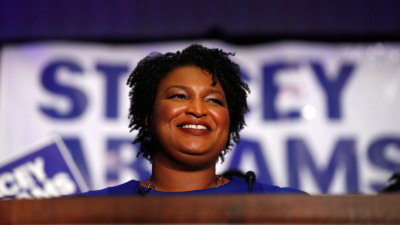 An Ode to Stacey Abrams. By Charles M. Blow / NYT
An Ode to Stacey Abrams. By Charles M. Blow / NYT
As the Bible tells the story, Moses delivers his people from bondage and to the “promised land,” but even with all his efforts he is not allowed to enter. He must gaze upon it from a distance.
This, I fear, is the story of Stacey Abrams. She built the huge voter registration and turnout machine that helped Joe Biden carry Georgia in 2020, and helped the state elect its first Jewish and Black senators, Jon Ossoff and Raphael Warnock, giving Democrats control of the Senate. If Warnock wins his runoff next month, she will have helped Democrats strengthen their control of the chamber. Read more
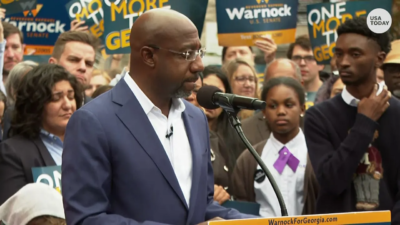 Warnock, Democrats file lawsuit over Georgia’s voting law in runoff. By Abraham Kenmore / Savannah Morning News
Warnock, Democrats file lawsuit over Georgia’s voting law in runoff. By Abraham Kenmore / Savannah Morning News
Voting law changes over last six years shortened period between general election and runoffs and affect early voting.
Over the weekend, officials in the Georgia Secretary of State office notified county officials that there would be no Saturday voting due to a state law prevents voting on the second Saturday before an election if there is a holiday on a Thursday or Friday. Thursday is Thanksgiving and Friday is a generically named “State Holiday.” The State Holiday in November replaced a previous holiday honoring Confederate Gen. Robert E. Lee’s birthday even though Lee was born in January. Raffensperger sent out a statement denouncing the lawsuit. Read more
Related: Herschel Walker has a problem: Kemp’s not on the December ballot. By Al Weaver / The Hill
 Why Florida Latinos turned out in favor of Republicans. By Carmen Sesin / NBC News
Why Florida Latinos turned out in favor of Republicans. By Carmen Sesin / NBC News
DeSantis flipped predominantly Hispanic Miami-Dade County and became the first Republican governor in 20 years to win what was once a Democratic stronghold.
Republican Gov. Ron DeSantis won the state with a stunning 59% of the vote, compared to Democrat Charlie Crist’s 40%. DeSantis outperformed former President Donald Trump’s 2020 Latino gains in Florida. DeSantis won 58% of the Latino vote, including 68% of Cuban Americans, 56% of Puerto Ricans, and 53% of all other Latinos combined, according to the NBC News exit poll. It was a jump from the 2018 results, when DeSantis narrowly beat Democrat Andrew Gillum by less than half a point, with 44% of the Latino vote. Read more
Related: There Is No One Story About Latino Voters. Geraldo Cadava / The New Yorker
Related: These Latino firsts made history in the 2022 midterm elections. By Nicole Acevedo / NBC News
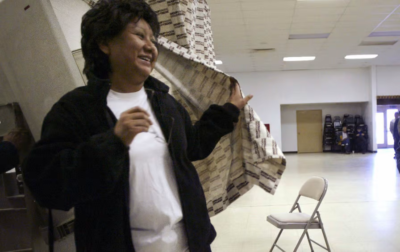 Why Democrats Lose When They Ignore the Native Vote. By Simon Moya-Smith / The Nation
Why Democrats Lose When They Ignore the Native Vote. By Simon Moya-Smith / The Nation
Indigenous organizers and activists say that the party can’t afford to overlook them any longer. Shown is Sharon Lewis, a Pueblo of Acoma Native, votes in Acoma, N.M. (Rick Scibelli / Getty Images)
Then came Tuesday, election night. When the numbers came in, and showed that gubernatorial incumbent Republican Greg Abbott had soundly defeated Democrat Beto O’Rourke by more than 10 points, Vasquez wasn’t surprised, but added that Beto might have had a better shot at winning had he courted the Native vote. “We have the fourth-largest Indigenous population in the country. We’re a huge voting bloc,” he said. In fact, Texas has the second-largest Indigenous population in urban areas (after New York City), including three Indian reservations. Read more
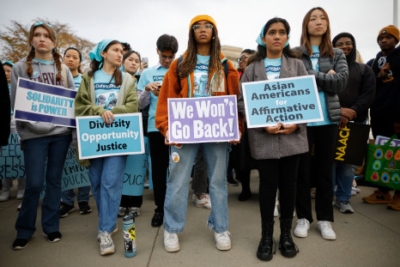 Ending Affirmative Action Will Be an ‘Earthquake’ for Colleges, Companies. By Steve Friess / Newsweek
Ending Affirmative Action Will Be an ‘Earthquake’ for Colleges, Companies. By Steve Friess / Newsweek
For some time now, it has been a foregone conclusion among most observers that the U.S. Supreme Court is poised by next summer to end the practice by colleges and universities of using race as a factor in admissions.
If the court determines that any benefit or preference based on race is unconstitutional, the impact would radiate far beyond elite colleges. Supporters fear and opponents hope that the court could gut a half century of programs and laws designed to help groups that have historically faced racial discrimination in the U.S. level the playing field, giving them greater access to education that might improve job opportunities and economic equality. At risk beyond preferences in college admissions: Government programs that require a certain percentage of contracts go to minority-owned companies. Scholarships and financial aid based on race or ethnicity. Hiring practices at private companies aimed at recruiting underrepresented groups. Race-specific outreach by social services agencies. Even hate crime laws could be in peril. Read more
Related: Affirmative action, but only in the womb? By Gunnar Gundersen / NCR
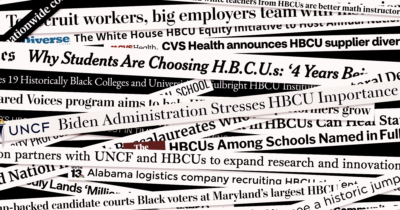 For Decades, Black Colleges Have Been Portrayed as Deficient. What Changed? By Oyin Adedoyin / The Chronicle of Higher Ed.
For Decades, Black Colleges Have Been Portrayed as Deficient. What Changed? By Oyin Adedoyin / The Chronicle of Higher Ed.
For a half century, Black colleges have frequently been portrayed as the basket cases of higher ed. Unflattering media attention perpetuated a public perception that had a cyclical, compounding effect: Negative coverage of financial trouble led to fewer philanthropic contributions and lower enrollment, which led to more financial trouble.
Now HBCUs are suddenly awash in glorifying headlines. They are touted as engines of economic mobility, a refuge for Black students, and the apex of Black culture. The United Negro College Fund, which advocates for and supports private HBCUs, raked in over $215 million in 2021, a record-breaking amount. Within the past two years, MacKenzie Scott, the ex-wife of Jeff Bezos, donated more than $500 million to over 20 Black colleges. The federal government last year set aside more than $6.5 billion for HBCUs. Read more
Related: One juvenile linked to dozens of HBCU threats, FBI says. By Kevin Johnson / USA Today
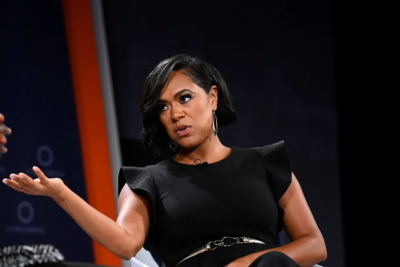 What Tiffany Cross’ firing from MSNBC tells us about who and what news organizations will defend. By Melanie McFarland / Salon
What Tiffany Cross’ firing from MSNBC tells us about who and what news organizations will defend. By Melanie McFarland / Salon
MSNBC hired Cross for her “authentic Black voice.” She told white people the truth about themselves. Now she’s gone
No other cable new show regularly examined the many ways that white supremacy is embedded structurally and historically throughout American society. And this is precisely what she pledged to do when she was hired in 2020. “It’s not enough to simply have a Black face on screen,” she told The Washington Post. “An authentic Black voice is just as important.” Here’s the thing about authenticity and realness when it comes to Black people with prominent positions in mainstream media, and Black women specifically: News organizations tend to support those voices until, for whatever reason, the cost of doing so becomes too high. Read more
Ethics / Morality / Religion
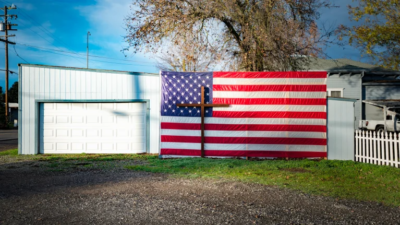 Why White Christian Nationalism Isn’t Going Away. By Samuel L. Perry and Andrew Whitehead / Time
Why White Christian Nationalism Isn’t Going Away. By Samuel L. Perry and Andrew Whitehead / Time
The midterm elections were hardly a shot of confidence for Christian nationalist politicians. True, Republicans like Marjorie Taylor Greene in highly gerrymandered districts cruised to victory. But candidates like Doug Mastriano, Dan Cox, and Darren Bailey lost their elections handily, and others like Lauren Boebert, Kari Lake, and Mark Finchem were all in hotly contested races.
What is the likelihood that Americans who subscribe to Christian nationalism take these results as a referendum against their movement? We think that’s highly doubtful. That’s because white Christian nationalists systematically over-estimate their strength in numbers. And they will almost certainly do so in the future. Christian nationalism is currently a minority position in the United States. Most Americans don’t believe that America has a special relationship with God, or that the federal government should declare the U.S. a “Christian nation,” or that being a Christian is important to being truly American. And most Americans want a separation of church and state. Moreover, tracking such views over decades shows they are slowly declining, not growing. Read more
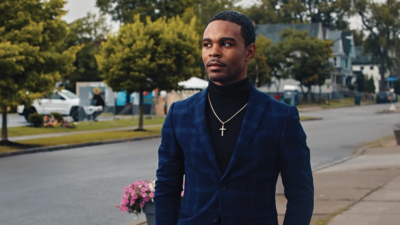 In a Sea of National Tragedies, Look to Buffalo’s Christians. By Emily Belz / Christianity Today
In a Sea of National Tragedies, Look to Buffalo’s Christians. By Emily Belz / Christianity Today
Those who lived through the racially motivated attacks are focusing on the local to see progress.
A handful of Black leaders on Buffalo’s East Side have decided they do not have to sit at a distance and feel hopeless. Instead they want to model how, by drawing near a wound, they can help heal it. As one leader told me, “Until those people become your people, and you have skin in the game, there’s no real call to action.” Christian community-development practitioners have long argued that a community’s healing, whether from violence or poverty, begins locally. It begins with the community’s own assets and continues with assistance from nonprofits and government programs. Read more
 Why It’s Become Harder to Joke About Anti-Semitism. By Yair Rosenberg / The Atlantic
Why It’s Become Harder to Joke About Anti-Semitism. By Yair Rosenberg / The Atlantic
Chappelle Was Right. It really is getting harder to joke about anti-Semitism—just not for the reasons he thinks.
That said, Chappelle is correct that it’s become more difficult to poke fun at anti-Semitism in front of an audience, but not because some censorious Jewish cabal is looking over the shoulder of Netflix’s multimillion-dollar man. The problem, I realized, is that as anti-Semitism and related conspiracy theories become more normalized in our discourse, laughing about them becomes harder, because you never know who might not get the joke. Read more
Historical / Cultural
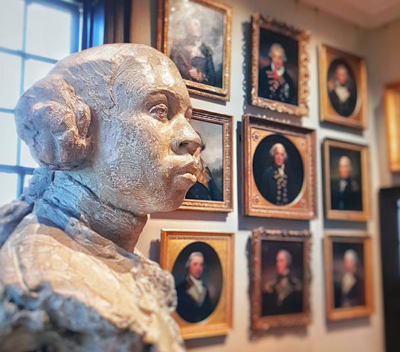 Olaudah Equiano’s Transnational Insights. By Taylor Prescott / AAIHS
Olaudah Equiano’s Transnational Insights. By Taylor Prescott / AAIHS
Sculpture of Olaudah Equiano, the Queen’s House, London (Wikimedia Commons)
Few figures of the eighteenth century have captured the attention of historians, literary critics, and scholars of Africana studies as much as Olaudah Equiano. One of the most prominent anti-slavery voices of his time, Equiano’s autobiography The Interesting Narrative of the Life of Olaudah Equiano not only yields insight into the author’s extraordinary life, but functions as a powerful polemic against one of history’s most sordid episodes, the practice of chattel slavery in the Americas. Read more
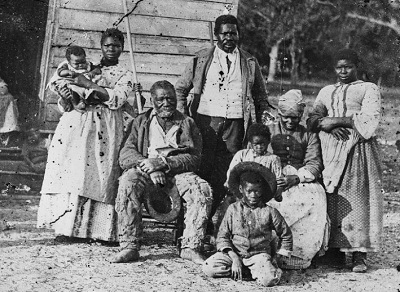 Denmark Vesey’s Family Legacy. By Xavier Aubrey Spencer / AAIHS
Denmark Vesey’s Family Legacy. By Xavier Aubrey Spencer / AAIHS
Five generations on Smith’s Plantation, Beaufort, South Carolina, 1862 (Library of Congress)
The family legacy of Denmark Vesey is rooted in interpersonal relations, self-concept, transcendence, and critical consciousness. These factors buffered my ancestors from racial stigma that some Blacks internalized from white Charlestonians, which for them generated a pathway to their socioeconomic success pre and post Civil War. Yet, systemic structural racism’s growth and power in Charleston was too abundant to defeat. Jim Crow laws contributed to the dismantling of my ancestors’ economic power that had spanned over forty years, and I imagine there are many other Black families alike that experienced this pain. Read more
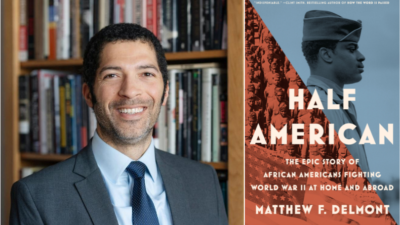 Matthew F. Delmont on Black Americans fighting for ‘double victory’ in WWII. By Jonathan Capehart / Wash Post podcast
Matthew F. Delmont on Black Americans fighting for ‘double victory’ in WWII. By Jonathan Capehart / Wash Post podcast
In this Washington Post Live conversation from Nov. 3, professor Matthew F. Delmont discusses his new book, “Half American: The Epic Story of African Americans Fighting World War II at Home and Abroad,” the important roles Black Americans played in every branch of the military, and the disrespect and violence they faced when returning home. Listen here
 This land is sacred to the Apache, and they are fighting to save it. By Dana Hedgpeth / Wash Post
This land is sacred to the Apache, and they are fighting to save it. By Dana Hedgpeth / Wash Post
Native Americans want to protect Oak Flat, a sacred site 60 miles east of Phoenix, from a mining operation
“This is where we came from,” said Nosie. “It’s the beginning of our being, our identity. Oak Flat is where the Creator made us and gave us this land. This is the centerpiece that makes up everything that we are. ”But Oak Flat is at risk of being damaged or destroyed to make way for a mining operation. Dozens of other sites that are considered sacred to American Indians have tribes and environmental groups fighting to keep out gas and oil operations, communications towers or highways. Read more
Related: Dedicating a memorial to Native Americans who served in U.S. military. By Dana Hedgpeth / Wash Post
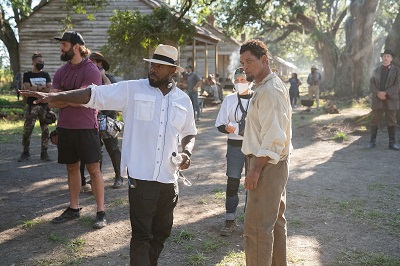 ‘Emancipation’: Inside Will Smith’s Unsparing New Slave Drama. By Chris Murphy / Vanity Fair
‘Emancipation’: Inside Will Smith’s Unsparing New Slave Drama. By Chris Murphy / Vanity Fair
Though audiences may be shocked, Smith and director Antoine Fuqua see the film as a necessary dose of “brutal and beautiful” historical realism.
At times, I found watching Emancipation so painful that it was almost unbearable. Its director, Antoine Fuqua, knew this and—to his great credit, I think—talked to me openly and at length for this group of Q&As about his film. Will Smith, a producer as well as the star, answered questions separately by email, and his costars Ben Foster and Charmaine Bingwa spoke to me as well. All of which is to say that—though the Apple Original Film was a late entry into the calendar after a now legendarily difficult year for Smith—the team is very much united behind it. In the movie, Smith plays Peter, a man who escapes the shackles of slavery through the treacherous swamps of Louisiana. It’s inspired by the frankly inconceivable trials and tribulations of an escaped slave best known to history as “Whipped Peter.” Read more
 Why Are So Many Young Rappers Dying? By Too $hort and E-40 / The Atlantic
Why Are So Many Young Rappers Dying? By Too $hort and E-40 / The Atlantic
The regularity of these killings has us concerned and thinking, Who’s next?
Jazz musicians weren’t routinely murdered in the street at the height of their career. Nor were rock stars. We just want the same truth for our young superstars. The inner city is like the MMA Octagon—it’s the cage, the trap. A lot of violent shit goes down, but it’s still home for many hip-hop artists. And there’s still a lot of hope, hunger, and love in the streets. We just need to find better ways to support each other. This is our generation’s responsibility as much as it is for the young MCs. Read more
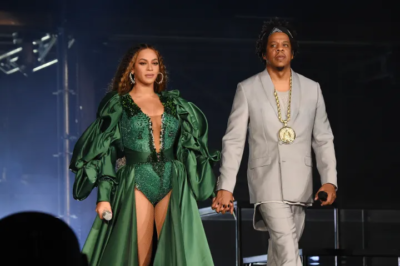 Beyoncé Ties Jay-Z For Most Grammy Nominations In History. By Cole Delbyck / HuffPost
Beyoncé Ties Jay-Z For Most Grammy Nominations In History. By Cole Delbyck / HuffPost
The music power couple each have a total of 88 nominations to their name.
You won’t break her soul, but you can’t stop Beyoncé from breaking records. The music superstar reigned supreme over the 2023 Grammy nominations on Tuesday morning, racking up a record nine nods mostly due to “Renaissance,” her first solo album of new material in more than five years. Ahead of the 65th Annual Grammy Awards in February, Beyoncé now stands as the most nominated female artist in the awards show’s history with a lifetime haul of 88 nominations. She shares the honor of being the most nominated artist ever with husband and musical collaborator Jay-Z, who also holds 88 nominations. Read more
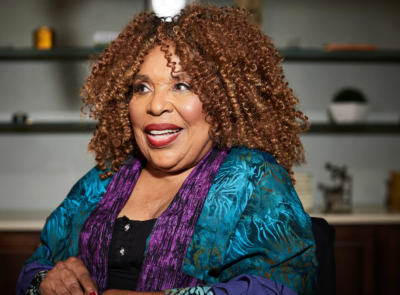 Roberta Flack has ALS, making it ‘impossible to sing,’ manager says. By Ben Brasch / Wash Post
Roberta Flack has ALS, making it ‘impossible to sing,’ manager says. By Ben Brasch / Wash Post
ALS, a rare but deadly disease, can silence anyone. Here’s what to know.
Site Information
Articles appearing in the Digest are archived on our home page. And at the top of this page register your email to receive notification of new editions of Race Inquiry Digest.
Click here for earlier Digests. The site is searchable by name or topic. See “search” at the top of this page.
About Race Inquiry and Race Inquiry Digest. The Digest is published on Mondays and Thursdays.
Use the customized buttons below to share the Digest in an email, or post to your Facebook, Linkedin or Twitter accounts.